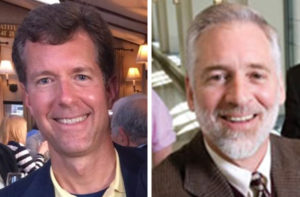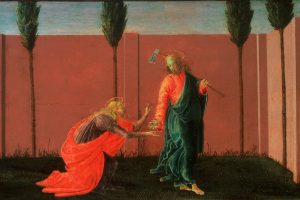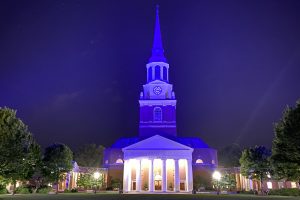Editor’s note: This piece by Steve Harmon and Curtis Freeman prompted a reply from two Southern Baptist writers, Lucas Stamps and Matthew Emerson. Freeman and Harmon are continuing the conversation started below with a follow-up piece here.
Why would a couple of theologians who haven’t identified themselves as Southern Baptists since the 1990s feel the need to say something publicly about resolutions issued by the recent meeting of the Southern Baptist Convention in Phoenix?
Our denominational affiliations are now with the Cooperative Baptist Fellowship, the Alliance of Baptists and the American Baptist Churches USA. But many of our former and current students have connections with churches of the SBC, and we live among people for whom the SBC is the primary public face of what is associated with being Baptist.
Three of the 10 resolutions passed by the SBC are of more concern to us than others. Surely the resolution “On the Five Hundredth Anniversary of the Protestant Reformation” should have noted the tremendous progress made in mutual understanding between Catholics and Protestants, and even convergence in their understandings of the doctrine of justification, in the past few decades.The Joint Declaration on the Doctrine of Justification issued by the Catholic Church and the Lutheran World Federation in 1999 was joined by the World Methodist Council in 2006 and affirmed by the Anglican Consultative Council in 2016. This summer the World Communion of Reformed Churches will mark the Reformation anniversary by officially joining the Joint Declaration on the Doctrine of Justification as well. Without noting such encouraging developments, the SBC resolution seems to communicate the message, “The Protestants were right then, and we’re still the ones who are right.”
We could easily say much more about the resolution “On the Necessity of Penal Substitutionary Atonement.” We would not reject everything in this approach to offering a theological explanation of what it is about the cross that brings about our salvation. It does rightly insist that God has acted in Christ and his cross to save us at great cost to God, and it is rooted in biblical passages such as Isaiah 53 and Deuteronomy 21:22-23/Galatians 3:13 that the church has traditionally associated with what God has done in the cross of Christ that we cannot do for ourselves in securing our redemption.
The root of our disagreement with the penal substitutionary atonement resolution is a differing location of the ultimate source of the violence of the cross. If it is God, then the cross reveals God as violent and the endorser of violence. If instead it is, as the Apostle Paul clearly states, that our Lord was crucified by “the rulers of this age” (1 Cor. 2:8), then the cross exposes humanity’s violence as sinful. It also reveals God’s solidarity with those who suffer violence and Jesus’ nonviolent way as that which triumphs over violence.
But the resolution explicitly connects this theology of a violent atonement where God is portrayed as a violent redeemer with the legitimation of society’s use of “redemptive” violence in a way that goes far beyond the classical expression of this understanding in Reformation theology. The resolution insists that the “‘anti-violence’ model of the cross” contradicts the vague reference to the civil order bearing “the sword” (Romans 13:4), ignoring sound exegetical reasons for not taking this as a reference to capital punishment. In any case we contend that the cross no more shows that God believes in the death penalty or other forms of “redemptive violence” than Jesus’ scourging suggests that God believes in torture.
At the same time, we realize that this is a confusing issue because it is not merely a matter of how one interprets specific texts or which option in a theology textbook typology one selects for an approach to a specific doctrine. It is meta-exegetical — a way of reading the whole biblical story that, if changed, turns it into a different story and therefore threatens one’s whole orientation to everything the Christian life entails. Careful attention to the whole Christian tradition calls for patience as well as persistence in offering alternative ways of imagining the entire life of Jesus — his life, death and resurrection as the means of God’s redemption and the way of discipleship. We are persuaded by John Calvin’s lovely description that “Christ has redeemed us … by the whole course of his obedience” (Institutes II.16.5).
We are glad that in the end, the SBC did pass a resolution “On the Anti-Gospel of Alt-Right White Supremacy.” It says many things that need to be said in this time and place, and we would join the SBC in saying them. Yet we are concerned about the contrast between the manner in which two of the resolutions were adopted. On the one hand, the SBC quickly and enthusiastically endorsed a resolution that linked its affirmation of penal substitutionary atonement with divine legitimation for the commitment of our society to the “myth of redemptive violence” (a phrase coined influentially by the late New Testament scholar Walter Wink).
On the other hand, the messengers could say what they ended up saying about the incompatibility of white supremacy and the gospel only after external public pressure that followed the initial decision by the resolutions committee not to introduce for adoption a resolution with more teeth in it proposed by an African-American Southern Baptist pastor led convention leaders to scramble to introduce a substitute resolution the following day that could be adopted.
Moreover, we are apprehensive about the deep and dangerous connection between a theology in which God is imagined as engaging in violence, legitimating violent wars for so-called “just” causes and approving the violent ending of human lives in the interest of upholding “justice,” and a reluctance to renounce explicitly a system that depends on keeping its power through the threat of various forms of violence.
We have noticed that challenging the notion that some violent responses to violence are justified often seems to cause people to respond with greater passion than if their most deeply-cherished convictions about the nature of God had been questioned. If they were to be convinced that the taking of human life by the state or its citizens is inherently unjust, they would lose the meaning of the national narrative that forms their identity as Americans. That may be too much for many American Christians to bear, but if so, it is symptomatic of nothing short of idolatry.
But how is this connected to a particular understanding of the atonement? A few years ago one of us shared on social media a BNG opinion piece “Should We Abolish the Death Penalty?” One comment in response objected, “It seems like the cross shows that God believes in the death penalty.” People are making these connections, but white Southern Baptists seem unwilling to confront the connections they have to a system of white privilege that has depended on the violent oppression of racial minorities and appealed to divine warrant for such a social arrangement.
Until white Southern Baptists not only denounce the ideology of white supremacy but acknowledge their complicity in a system that grants them privilege as the legacy of violent power theologically rationalized, a recent Babylon Bee satirical article titled “Southern Baptists Vote to Affirm Inerrancy of Second Amendment” will continue to read as very-close-to-reality.
Related stories and opinion:
Satisfaction guaranteed: Southern Baptists refute efforts to soften the atonement
Enough ‘Virgin in the Volcano’ theology
In annual meeting do-over, Southern Baptists denounce ‘alt-right’ white supremacy
White racist ‘alt-right’ denounced by Southern Baptists: That’s a win for Arlington, Texas, pastor
A resolution condemning white supremacy causes chaos at the Southern Baptist Convention







































































